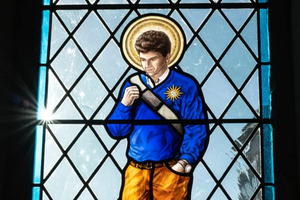Italian Prosecutors Investigate Illegal Sale of Apparent Carlo Acutis Relics Online
According to canon law of the Catholic Church, the sale of first- and second-class relics is strictly forbidden. Relics can only be given away by their owners, and some very significant relics, such as a heart, arm, etc., cannot be given away without the permission of the Vatican.

Italian prosecutors are investigating the illegal online sale of alleged relics of Blessed Carlo Acutis, who will be declared the first millennial saint next month.
The investigation by the Perugia Public Prosecutor’s Office was prompted by a complaint by the bishop of Assisi, the city where Acutis’ tomb is located for public veneration.
“On the internet, there is a marketplace for relics concerning various saints, such as our St. Francis, complete with a price list. Something impossible to accept,” Bishop Domenico Sorrentino of Assisi-Nocera Umbra-Gualdo Tadino said in a statement on March 26.
Bishop Sorrentino filed a formal complaint with Italian authorities after learning of an internet auction of an alleged first-class relic of Acutis’ hair, which sold online for 2,000 euros by an anonymous user.
“We do not know whether the relics are real or fake,” the bishop said. “But if it were also all fabricated, if there was deception, we would be not only in the midst of a fraud but also of an insult to religious belief.”
According to canon law of the Catholic Church, the sale of first- and second-class relics is strictly forbidden. Relics can only be given away by their owners, and some very significant relics, such as a heart, arm, etc., cannot be given away without the permission of the Vatican.
Acutis’ canonization Mass is scheduled to take place in St. Peter’s Square on April 27 during the Church’s Jubilee of Teenagers.
- Keywords:
- carlo acutis
- relics















